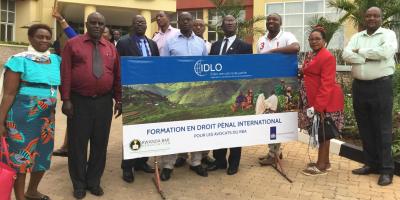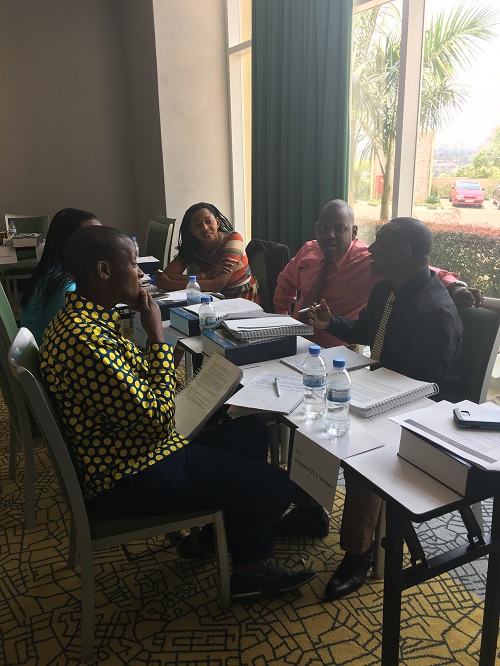
IDLO conducted a training for 75 defense lawyers from the Rwandan Bar Association (RBA) in Kigali from 29 August to 15 September as part of its project to strengthen the capacity of Rwandan defense lawyers to handle genocide transfer cases in accordance with Rwandan and international criminal law (ICL). The training is a first of three “blocks” in a series which is set to continue through the end of 2017.
23 years after Rwanda’s genocide, which saw between 800,000 and 1 million killed (Human Rights Watch), 93 people have been indicted, 61 sentenced, and 14 acquitted by the International Criminal Tribunal for Rwanda (ICTR). Suspects remain at large and exiled in different countries around the world, and ensuring that they are brought to justice on national soil is a major priority for the Government of Rwanda. As a result of the progress made in recent years in implementing reforms and modernizing the Rwandan justice sector, the ICTR transferred 3 cases and 5 fugitive files to be tried under Rwandan jurisdiction in light of its closure in 2015.
What’s more, courts in a small but significant number of countries, including Canada, Norway, and The Netherlands, agreed to extradite genocide suspects to Rwanda. To deal with these cases, Rwanda's Superior Council of the Judiciary established the Chamber for International Crimes within the High Court, to be based in the town of Nyanza.
|
Q&A with the donor IDLO spoke with Iris de Groot, Second Secretary Justice & Good Governance from the Embassy of the Kingdom of the Netherlands in Rwanda, about the value of this project from a donor perspective. How do you see the project of capacity development in international law being crucial to Rwandan defense lawyers, and to improving access-to-justice in the country? Nowadays, Rwanda is considered to be able to apply fair principles of law regarding extradited genocide suspects. Nevertheless, in order to deal with the defense of extradited genocide suspects, the RBA selected 75 experienced and qualified lawyers from its members. However, in order to enhance and keep the knowledge and skills of these 75 lawyers up to date (theory and practical skills), the RBA requested the IDLO to provide additional training. This activity further supports the justice sector in Rwanda and improves access to and the quality of justice for a particular group; extradited genocide suspects. It is worth mentioning that in all these years of Dutch support to the Rwanda justice sector the focus has been mainly to support prosecutors, judges instead of solely targeting the defense side of the justice system. Therefore, support to the defense side – through the RBA and IDLO – is justified and needed and fits within the objectives of the Dutch policy regarding access to qualitative justice. |
It is in the interest of both the accused and the victims in question that the court, prosecution and defense counsel are fully prepared to handle these cases in accordance with principles of Rwandan and international criminal law. Given that international criminal law is an evolving field, there is an opportunity for the Rwandan defense lawyers to benefit from continuing legal education.
IDLO’s support to the Rwandan Bar Association
With support from the Government of the Netherlands, IDLO is working with the Rwandan Bar Association to develop and implement training courses tailored to the needs of the defense lawyers involved in the transferred genocide cases.
The first training gave an overview of ICL principles, including a review of applicable laws and the relevant rules of procedures, as well as the history and scope of international criminal justice. The training also covered laws concerning the transfer of cases and defense strategies, including evidence, factual and procedural means, with a focus on areas diverging from national practice.
While many defense lawyers learn about international criminal law in university, the knowledge tends to be general and is not often used in practice. This training fills in potential knowledge gaps for defense lawyers that were previously underused.
A participant in the training, Mr. Christophe Twagirayezu expressed confidence in his abilities due to the knowledge increase after the training: “To be honest, after this training I like international criminal law much better. […] After the 3 blocks of training, I think I’ll be able to be a defense lawyer in any situation having to do with international criminal law.”
Trainees also discussed the duties of defense counsel representing people accused of international crimes, plea bargain agreements, and the prosecution’s obligation to prove the charges beyond a reasonable doubt in a fair and public trial.
|
Q2: In your opinion, where do you think the Rwandan justice sector needs further support to advance and/or strengthen access to justice, especially in regards to genocide cases? The Embassy has supported and is supporting several projects which strengthen access to justice, especially in regards to genocide cases. For example, the Rwandan Judiciary and National Public Prosecution Authority, including the Genocide Fugitive Tracking Unit have been supported to fully meet international standards to track down and provide in-country trials to high profile genocidaires extradited to Rwanda from abroad. Currently we are also working with the Government of Rwanda and Aegis Trust to digitize and preserve the Gacaca files, as these documents are of great value, both for Rwandans seeking truth and justice and for international researchers, including prosecutors from around the world. Lastly, we have established a panel co-chaired by the Ministers of Rwanda and the Netherlands which is composed of high level members leading in the Justice sector institutions in both countries. The panel is a forum through which the governments of Rwanda and the Netherlands share ideas on mutually beneficial issues occurring within the justice sector in both countries. Q3: For the Government of The Netherlands, what is the significance of their development support to Rwanda? The combination of aid and trade can be mutually beneficial. The Netherlands is therefore transitioning from an aid to a trade relationship with more and more countries, including Rwanda since last year. But since economic growth is not yet benefiting all sections of the population, the guiding principle of the Government of the Netherlands remains sustainable and inclusive growth. The Netherlands will therefore continue to tackle inequality, to invest in the rule of law and to emphasize the importance of sustainability. |
The Netherlands will (therefore) continue to tackle inequality, to invest in the rule of law and to emphasize the importance of sustainability. - Iris de Groot, Embassy of the Kingdom of the Netherlands in Rwanda
|
Participants discuss lessons learned during the training in Kigali. |
After the training, participants expressed increased knowledge about negotiating with the prosecution after a guilty plea and the rights of the accused. Ms. Jeanne d’Arc Umutesi, a lawyer representing one of the accused persons in a transfer case, said that before the training she wasn’t aware that, for example, “on the defense side, it is sometimes strategically best not to present a defense case. If, after an in-depth analysis of the testimony of prosecution witnesses, we think the evidence is insufficient to sustain a conviction, we are not obliged to present witnesses.”
With 2 more blocks of training to come, activities will focus on the practical application of lessons learned as part of sustainable solutions to strengthen the Rwandan justice sector in the long term.
Ms. Umutesi continued, “I acquired a lot of high-level knowledge that will indeed help me in my every day work, and in particular the treatment of transferred cases. I have the theory and I am going to put it into practice through my work every day.”


